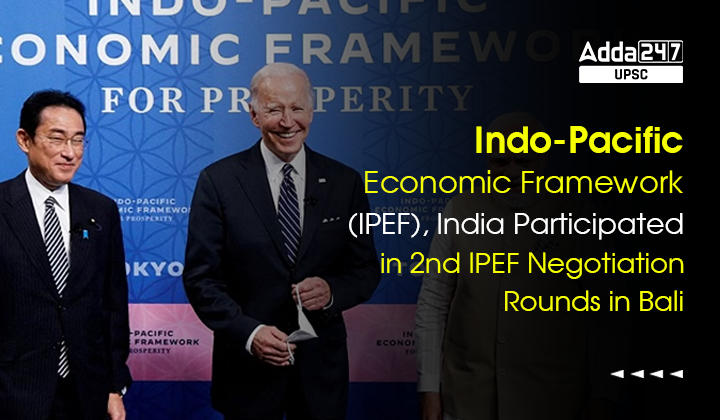Table of Contents
Indo-Pacific Economic Framework (IPEF): It is a US-led initiative aimed at strengthening economic and trade ties among participating countries in the region. Indo-Pacific Economic Framework (IPEF) is also important for UPSC Prelims and UPSC Mains Exam (GS Paper 2- International Relations- International Grouping and India)
Indo-Pacific Economic Framework (IPEF) in News
A Inter-ministerial delegation from India led by the Department of Commerce took part in the second Indo-Pacific Economic Framework for Prosperity (IPEF) round of negotiations in Bali, Indonesia.
- The First IPEF Round occurred in Brisbane, Australia from December 10-15, 2022, and the Special negotiating round held in New Delhi, India from February 8-11, 2023.
- Above was followed by the third round that was held in Bali, from 13th to 19th March 2023.
2nd IPEF Negotiation Round Details
The 2nd Indo-Pacific Economic Framework for Prosperity (IPEF) negotiations round took place in Bali, Indonesia from 13th-19th March 2023.
- Participation: negotiators from 13 countries, including India, participated in the second round of negotiations for the Indo-Pacific Economic Framework for Prosperity (IPEF) in Bali, Indonesia.
- IPEF Pillars: During Bali round of negotiations, discussions covered all four pillars of the IPEF, and India participated in discussions related to Pillars II to IV. These four pillars are-
- Trade (Pillar I);
- Supply Chains (Pillar II);
- Clean Economy (Pillar III); and
- Fair Economy (Taxation & Anticorruption) – (Pillar IV)
- Mandate: During the Bali round, IPEF Partners engaged in in-depth text-based discussions and follow-up conversations aimed at advancing a shared vision for an open, connected, prosperous, and resilient Indo-Pacific region.
- Significance: IPEF Partners have committed to an ambitious negotiating schedule in 2023, with the aim of achieving tangible benefits to enhance economic competitiveness and prosperity in their respective countries.
- More information regarding the next in-person negotiating round will be disclosed at a later time.
India at 2nd IPEF Negotiation Round
During the Bali negotiating round, the Chief Negotiator of India restated their belief that IPEF would promote inclusive development and deepen economic engagement in the region through trade and investment enhancement.
- Along with Pillar Leads, the Chief Negotiator also held bilateral meetings with stakeholders and representatives from IPEF countries.
- The Stakeholders engagement session and Business Forum, held on the sidelines of the Bali Round, saw participation from interested Indian companies.
- During the Business Forum, a representative from the National Payments Corporation of India (NPCI) delivered a detailed presentation on the successful implementation of the Unified Payment Interface (UPI), a digital public infrastructure in India.
What is Indo-Pacific Economic Framework (IPEF)?
The Indo-Pacific Economic Framework (IPEF) is a US-led initiative aimed at strengthening economic and trade ties among participating countries in the region.
- Mandate: Indo-Pacific Economic Framework (IPEF) focuses on addressing important issues such as supply chain resilience in the aftermath of the pandemic.
- Participation: The group of member nations in IPEF comprises Australia, Brunei, India, Indonesia, Japan, South Korea, Malaysia, New Zealand, the Philippines, Singapore, Thailand, and Vietnam.
- The members include seven of the ten countries in the Association of Southeast Asian Nations (ASEAN), all four countries in the Quadrilateral Security Dialogue (Quad), and New Zealand.
- Collectively, these nations contribute to 40% of the worldwide GDP.
- Significance: While it is not a free trade agreement and does not include specific provisions for market access or tariff reductions, experts believe it could potentially pave the way for future trade deals.
Indo-Pacific Economic Framework (IPEF) Pillars
The Indo-Pacific Economic Framework (IPEF) aims to address various economic and trade matters in the region. Its four main pillars include-
- Trade: trade with a focus on digital economy and emerging technology, labor and environmental commitments, trade facilitation, transparency, and corporate accountability.
- Supply Chains: The IPEF also intends to establish a first-of-its-kind supply chain agreement to enhance supply chain resilience and prevent disruptions.
- Clean Energy: the IPEF envisions high-ambition commitments in clean energy and decarbonization, such as renewable energy targets, carbon removal purchasing commitments, energy efficiency standards, and measures to combat methane emissions.
- Fair Economy: Lastly, the IPEF includes a tax and anti-corruption pillar with commitments to implement effective tax, anti-money laundering, and anti-bribery schemes aligned with American values.
Indo-Pacific Economic Framework (IPEF) FAQs
Q. What is the Indo-Pacific Economic Framework (IPEF)?
Ans. The IPEF is a framework proposed by the United States to enhance economic cooperation and trade in the Indo-Pacific region. It aims to foster a shared vision for an open, connected, and prosperous region through collaboration among participating countries.
Q. Who are the participating countries in the IPEF?
Ans. The participating countries in the IPEF include Australia, Brunei, India, Indonesia, Japan, South Korea, Malaysia, New Zealand, the Philippines, Singapore, Thailand, and Vietnam.
Q. What are the pillars of the IPEF?
Ans. The IPEF focuses on four main pillars: trade facilitation, supply chain resilience, infrastructure and decarbonization, and taxation and anti-corruption.
Q. Is the IPEF a free trade agreement?
Ans. No, the IPEF is not a free trade agreement. It is a framework for participating countries to engage in crucial economic and trade matters that concern the region. While it does not outline market access or tariff reductions, it can pave the way for future trade deals.
Q. What is the goal of the IPEF?
Ans. The goal of the IPEF is to strengthen economic cooperation and trade among participating countries in the Indo-Pacific region. It seeks to promote an open, connected, and prosperous region, while addressing challenges such as supply chain disruptions and climate change.
Read current affairs for UPSC



 TSPSC Group 1 Question Paper 2024, Downl...
TSPSC Group 1 Question Paper 2024, Downl...
 TSPSC Group 1 Answer key 2024 Out, Downl...
TSPSC Group 1 Answer key 2024 Out, Downl...
 UPSC Prelims 2024 Question Paper, Downlo...
UPSC Prelims 2024 Question Paper, Downlo...
